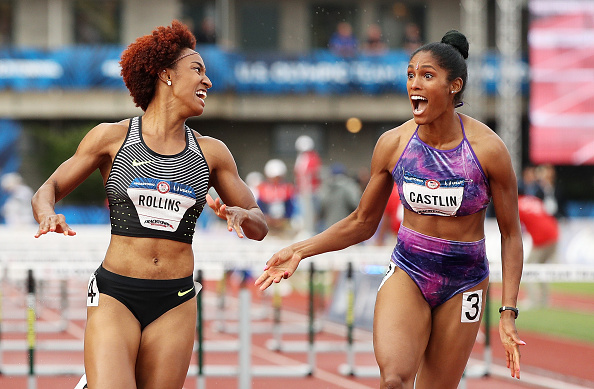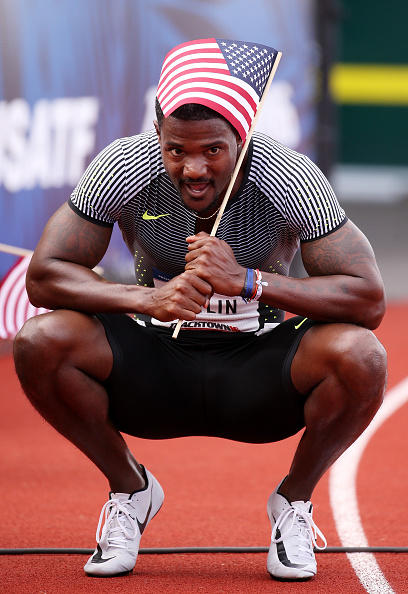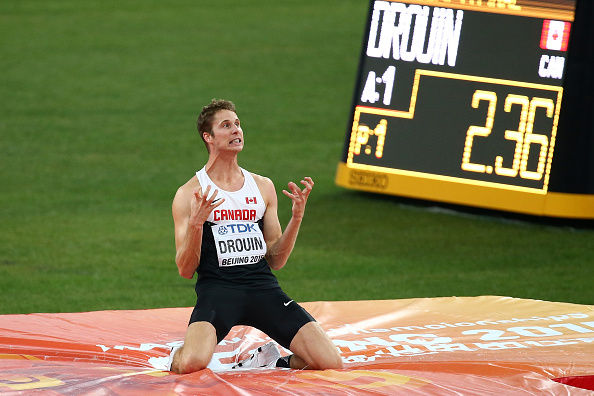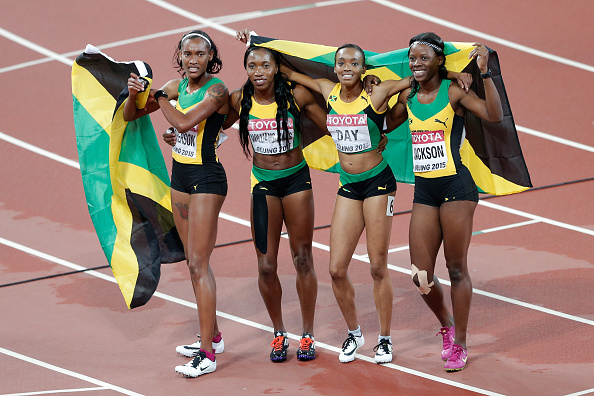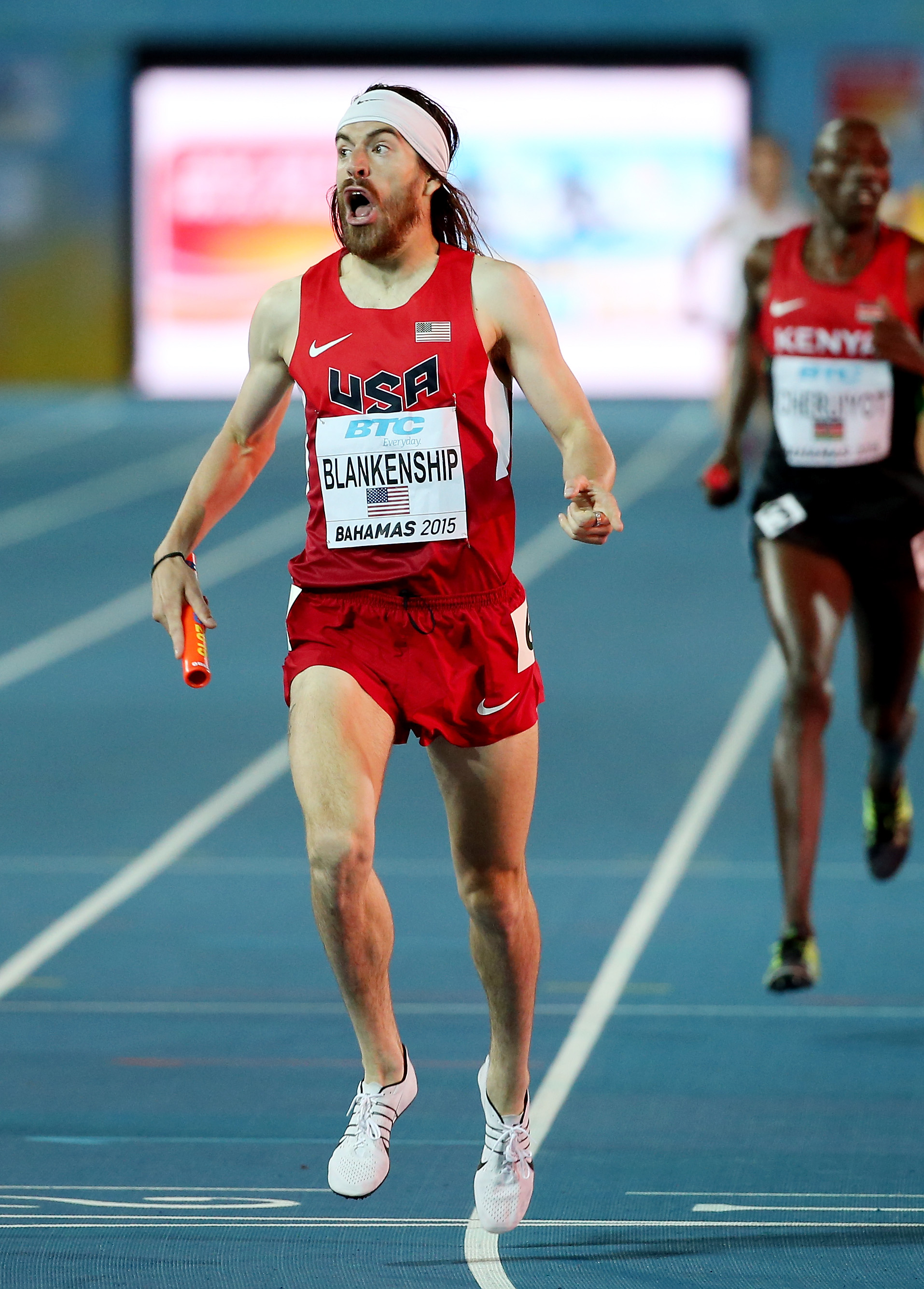EUGENE — The women’s 100 hurdles here Friday at the 2016 U.S. Olympic Track Trials proved one of those rare sports events that truly lived up to expectations. It was the race of the meet: Brianna Rollins winning in 12.34 seconds, the second-fastest Trials final ever.
The second- through seventh-place finishers made for the fastest finishes for place in Trials history. Kristi Castlin took second, in 12.5, Nia Ali — just 14 months after giving birth to a son, Titus — 12.55.
The immediate aftermath made the race all the more memorable. Castlin, given a moment on NBC, said this:
"I really just want to dedicate this race to every single family, every person who has to go on after losing someone they love to gun violence," adding, "It really was heavy on my heart, so I really wanted to dedicate that to everyone in the world who's had to deal with that.”
Many will say that sports are, or ought to be, separate from politics. Indeed, it’s tempting here in snug little college-town Eugene -- and, more, within the track and field bubble that is historic Hayward Field, with a stadium-record 22,847 jammed in on Saturday -- to deem events in Louisiana, Minnesota and Texas far away.
This ignores reality.
As the International Olympic Committee president Thomas Bach put it in a speech in South Korea in 2014, “In the past, some have said that sport has nothing to do with politics, or they have said that sport has nothing to do with money or business. And this is just an attitude which is wrong and which we can not afford anymore.
“We are living in the middle of society and that means we have to partner up with the politicians who run this world.”
He also observed, in a speech at the United Nations in November 2013, that it “must always be clear in the relationship between sport and politics that the role of sport is always to build bridges,” adding, “It is never to build walls.”
To that end, sports stars can have a powerful impact in advancing precisely the sort of dialogue we — all of us — need as we head further into the heat of a summer that, with two potentially volatile political conventions coming up, increasingly seems to evoke the discord and discontent of 1968.
Across the United States, Saturday saw protests tied to police shootings of black men: in Baton Rouge, San Francisco, Chicago, West Palm Beach, Fort Lauderdale, Pittsburgh, Philadelphia and Newport, Rhode Island.
The flag at the southern end of Hayward Field has been flying this second half of these Trials at half-mast — in unspoken testimony to our country’s unhealed wounds connected to race and policing.
If anyone needs a living reminder of how far we have come and how far we have yet to go — John Carlos, whose black-gloved left fist along with Tommie Smith’s right made history at the Mexico City Olympics in 1968, has been here in Eugene this week, a powerful reminder of how we can all do better.
If Friday's women's 100 hurdles was spectacular, so too was the bang-bang-bang sequence that closed Saturday's run: the men's 5000, won by 41-year-old Bernard Lagat; the men's 200, won by Justin Gatlin, who earlier in the meet had taken the 100, with 400 winner LaShawn Merritt running second; and the men's 110 hurdles, won by University of Oregon star Devon Allen.
Punctuating that brilliance: an appeal from Gatlin, over the Hayward loudspeakers that we all do better by each other.
"There is a lot that has been going on in America the last couple days," he said a few moments later, in the press tent. "It's sad that it happens around the 4th of July, when we should all be proud to be Americans.
"I just told everyone in the stadium, I said, I challenged them: 'Love someone. Leave the stadium, because there's so much love in this stadium the last couple days. Take that love with you. Just give it to somebody you have never loved before.' Go up to them and say, 'Hey, I love you for being an American.'
"We need that as Americans. When we are overseas, sometimes you don't see an American flag. Maybe sometimes you see one American flag. Those people holding up American flags are so proud to be Americans. And I want everybody to understand that when we go down to Rio, we are representing the United States of America. We want to represent with pride. It's just so sad to see everything that is happening right now. I just want everybody to be happy."
Gun violence has been a scourge on the American landscape for far too long.
In Kristi Castlin's case, the issue is deeply personal.
Her father, Rodney Castlin, was shot to death on December 7, 2000. He was the night manager of a motel in Kennesaw, Georgia, killed in a robbery that produced $304. He was just 36.
Just weeks ago, James Lorenzo Randolph, now 34, was convicted of multiple felonies in connection with the shooting, including murder, and sentenced to three consecutive life terms plus 35 years. He was connected to the case in 2012 by a fingerprint finally run through the FBI's national database.
Kristi Castlin turned 28 on Thursday. She was just 12 when her father was murdered.
"I definitely know first-hand now it feels, not just to be a child but to lose someone you love to gun violence," she said in an interview, adding, "Things that money buys, all the material things -- when you lose someone that you love, it’s really hard. It’s just sad whether black, white or indifferent, people treating lives like they are disposable."
We need more of this.
More stories about the real-life impact of gun violence.
More real people -- and that includes athletes -- to speak up about what's so obviously right.
We need initiatives like the one the NBA launched last December — with stars such as Stephen Curry, Carmelo Anthony, Chris Paul and Joakim Noah lending their voices to a pubic-service announcement in support of Everytown for Gun Safety. It ends with Curry, the Golden State Warriors star, saying, “We can end gun violence.”
In the same vein, LeBron James, the Cleveland Cavaliers star, has been outspoken on the matter. He took to Twitter Thursday with this:
https://twitter.com/KingJames/status/751288463375233025
Serena Williams, the tennis star, won the Wimbledon women’s singles title on Saturday, a record-tying 22nd Grand Slam; later Saturday, Serena and sister Venus Williams won the Wimbledon women’s doubles championship, a 14th Grand Slam doubles title together.
Here was Serena Williams a few months ago in Wired magazine:
"So to those of you involved in equality movements like Black Lives Matter, I say this: Keep it up. Don’t let those trolls stop you. We’ve been through so much for so many centuries, and we shall overcome this too (see “Get Up, Stand Up”). To other people, I say: When someone’s harassing someone else, speak up! J.K. Rowling spoke up for me this summer, and it was an amazing feeling — I thought, 'Well, I can speak up, too.' ”
To be clear: it’s not that every athlete, whether on the Olympic team or not, has a responsibility to speak up.
No one is saying that is an imperative.
But it’s also the case that the U.S. track team, along with the U.S. basketball teams, makes for the picture of the diverse and multicultural America that we genuinely are in these early years of the 21st century.
With that comes opportunity.
"We have a voice," Gatlin also said. "We should be able to use that voice with love and caring."
And unlike the basketball teams — in particular, the NBA stars — track and field athletes are way more often built like most of us, meaning the intimidation factor for the average fan is way lower. Also, the track stars tend to be remarkably accessible.
Before Saturday’s action at Hayward, the distance standout Mary Cain was walking down Agate Street, stopping — just like everyone else — at the long light at Franklin Boulevard.
A few minutes later, Matthew Centrowitz — it would be shocking if he isn’t top-three in Sunday’s men’s 1500 final — went jogging by on Franklin, out for an off-day slow run.
DeeDee Trotter, the three-time Olympian at 400 meters, bronze medalist in 2012 and two-time gold winner in the relays (2004, 2012), saw her 2016 bid get as far as the semifinals.
On Saturday, she posted to Twitter:
https://twitter.com/DTrott400m/status/751858033832046592
Similarly, Hazel Clark, three times an Olympian at 800 meters, said on Twitter:
https://twitter.com/hazelclarktv/status/751887521513177089
Michael Tinsley, London 2012 silver medalist in the men's 400-meter hurdles, said Friday after posting the top qualifying time, 49.15, in the event semifinals, “I want to start off saying that black lives matter. My condolences to the people who lost their lives to cops and condolences go out to the cops that were killed in Dallas.”
Jason Richardson, London 2012 silver medalist in the 110-meter hurdles, gold medalist in the event at the 2011 world championships, took to Twitter earlier this week to tell a story about how, when he was 17, he was stopped by police and given a traffic ticket.
Richardson posted: “Only after closing the truck did I realize the officer was standing at his door, hand on gun …” And: DON’T tell me what to wear, how to speak, or what to do until something like this happens to you.”
And this:
https://twitter.com/JaiRich/status/750930222111797249
The next day, Thursday, he posted a follow-up:
https://twitter.com/JaiRich/status/751081933535227904
Like Trotter, Sanya Richards-Ross, the London 2012 400 gold medalist (five medals in all over three Games, four gold), saw her competitive career come here to an end. Battling injury, she started but could not finish the first round in the 400.
She has already made the smooth transition to broadcasting. On Instagram this week, she posted this:
The flag fluttered softly in the breeze Saturday at Hayward.
Before the Olympic Games in Rio comes the Republican convention, the week of July 18 in Cleveland, and the Democratic convention, the week of July 25 in Philadelphia.
We all — athletes and the rest of us — have the chance to speak up.
Just as Robert F. Kennedy did on April 4, 1968, in Indianapolis, upon learning of the death of Martin Luther King Jr. Here is what the senator said, just two months before he himself would be killed by gun violence:
“Martin Luther King dedicated his life to love, and to justice between fellow human beings. He died in the cause of that effort. In this difficult day, this difficult time for the United States, it’s perhaps well to ask what kind of a nation we are, and what direction we want to move in.
“For those of you who are black — considering the evidence evidently is that there were white people who were responsible — you can be filled with bitterness, and with hatred, and a desire for revenge.
“We can move in that direction as a country and greater polarization, black people amongst blacks, and white amongst whites, filled with hatred toward one another.
“Or we can make an effort, as Martin Luther King did, to understand, and to comprehend, and replace that violence, that stain of bloodshed that has spread across our land, with an effort to understand, [with] compassion and love. He died in the cause of that effort.
“What we need in the United States is not division; what we need in the United States is not hatred; what we need in the United States is not violence and lawlessness, but is love, and wisdom, and compassion toward one another, and a feeling of justice toward those who still suffer within our country, whether they be white or whether they be black.
“So I shall ask you tonight to return home, to say a prayer for the family of Martin Luther King, that’s true, but more importantly, to say a prayer for our own country, which all of us love — a prayer for understanding and that compassion of which I spoke.
“We can do well in this country. We will have difficult times. We’ve had difficult times in the past but we — and we will have difficult times in the future. It is not the end of violence; it is not the end of lawlessness; and it’s not the end of disorder; it’s perhaps well to ask what kind of nation we are.
“But the vast majority of white people and the vast majority of black people in this country want to live together, want to improve the quality of our life and want justice for all human beings that abide in our land.
“Dedicate ourselves to what the Greeks wrote so many years ago: to tame the savageness of man and make gentle the life of this world," a reference indeed to the Olympic ideal.
“Let us dedicate ourselves to that," Senator Kennedy said in conclusion, "and say a prayer for our country and our people.”


